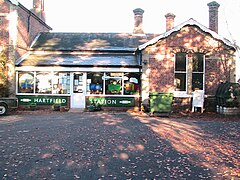Hartfield railway station
Hartfield | |
|---|---|
 | |
| General information | |
| Location | Wealden, East Sussex |
| Owned by | Southern Railway Southern Region of British Railways |
| Managed by | London, Brighton and South Coast Railway |
| Platforms | 1 |
| Key dates | |
| 1 October 1866 | Opened |
| 7 May 1962 | Closed to goods traffic |
| 2 January 1967 | Closed to passenger traffic |
Hartfield was a railway station serving Hartfield, England, on the Three Bridges to Tunbridge Wells Central Line which closed in 1967, a casualty of the Beeching Axe.[1]
The station opened on 1 October 1866 and the buildings were designed by Charles Henry Driver.[2]
The station building is now divided between a day nursery and a private house. The route of the railway line is now a cycle path (the Forest Way).[3] A.A. Milne, the creator of Winnie-the-Pooh, lived in Hartfield.
The station appears in a delightful British Transport Film entitled Farmer Moving South, which recounted the moving of the entire farm stock of Sir Robert Ropner by special train from Skutterskelfe Hall in Yorkshire to Hartfield in December 1950. The entire move took 30 hours and was nine hours late in arriving at East Grinstead on 15 December.[4] The film is available on a BFI DVD.
| Preceding station | Disused railways | Following station | ||
|---|---|---|---|---|
| Forest Row | British Rail Southern Region Three Bridges to Tunbridge Wells Central Line |
Withyham |
Reopening
With regard to the possible reopening of the remaining section of the line from Tunbridge Wells to Three Bridges, number of obstacles would appear to stand in the way of such action, most notably:
1) An industrial site currently occupies the former location of Forest Row railway station as well as a small recycling centre to west.
2) The formation has been built across in several places notably in East Grinstead where about one mile of the trackbed from Station Road to the Lewes Road tunnel has been taken over for a relief road (the A22 ironically named "Beechings Way" after Richard Beeching whose recommendations closed the railway line). As there is no feasible alternative route into the station, this road would need to be reconverted back to rail. Any such action would in all likelihood result in a cut in capacity on an already highly congested road network.
3) The site of Grange Road has disappeared under a small parade of shops as well as housing which block 0.64 miles of the formation.
Gallery
-
Remains of the platform from the cycle path
-
Hartfield station in 2005
-
Another view of Hartfield station
See also
References
- ^ Hartfield railway station on Subterranea Britannica
- ^ "Opening of the Tunbridge Wells and East Grinstead Branch of the London, Brighton & South Coast Railway". Sussex Advertiser. British Newspaper Archive. 3 October 1866. Retrieved 8 August 2016 – via British Newspaper Archive.
{{cite news}}: Unknown parameter|subscription=ignored (|url-access=suggested) (help) - ^ "Forest Way" (PDF). East Sussex CC. Retrieved 2007-08-12.
- ^ Gould, David (1983). Three Bridges to Tunbridge Wells. The Oakwood Press. p. 47. ISBN 978-0-85361-299-5.



